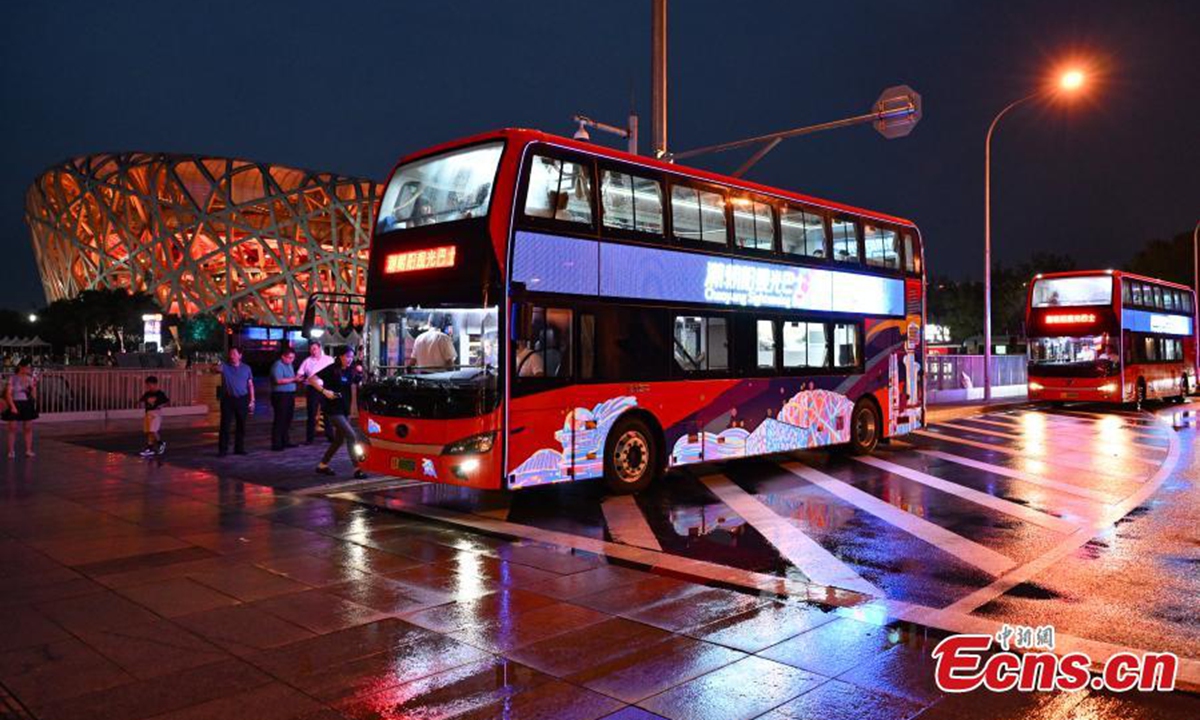ARTS / CULTURE & LEISURE
Boundless potential remains in future of inbound ‘China Travel’

A sightseeing bus stops in front of the iconic Bird's Nest stadium or National Stadium in Beijing, Aug. 18, 2024. Photo: China News Service
Thanks to expanding visa-free policies and favorable conditions like more manageable payment methods for international travelers, an increasing number of tourists are flocking to China.
A Chinese Foreign Ministry spokesperson mentioned at a recent press conference that in the first seven months of 2024, the number of foreigners entering China through various ports exceeded 17 million, showing a year-on-year increase of 129.9 percent.
Based on data from the National Immigration Administration, the number of foreigners entering through visa-free entry channels reached 8.542 million in the first half of the year, showing a significant increase of 190 percent year-on-year.
Ctrip Group, a leading online travel agency in China, announced that net revenue in its unaudited financial performance for the second quarter of 2024 reached 12.8 billion yuan ($1.8 billion), a year-on-year increase of 14 percent.
Each traveler has a unique perspective and experience. A multitude of foreign tourists have shared their experiences of traveling in China online, with the traffic data surpassing 1 billion views. ChinaTravel has become a buzzword on social media.
So what have international travelers highlighted in their China travel experiences?
Many travelers have expressed shock and fascination after uncovering China's rich history and culture by visiting museums and historical sites and experiencing traditional activities. China's vast and diverse natural landscapes, from pristine forests to majestic mountains, have been captured in travel photos and praised by tourists for their scenic beauty. The modern achievements of China, including high-speed trains, intelligent city features, and green development, have left a deep impression on international visitors.
Foreign visitors often comment on the safety they feel while traveling in China, sharing personal anecdotes of feeling secure while exploring different parts of China, including late-night walks without fear of theft or assault. Female travelers, in particular, have reported feeling safe in China, noting that they do not experience the same level of street harassment as in some other countries.
Stories of friendly interactions with locals eager to help foreign visitors have contributed to a warm and welcoming atmosphere for tourists, reflecting their deep engagement with locals. These comments from international travelers and vloggers reflect a growing interest and positive reception toward travel in China.
Then what are the catalysts behind the boom in inbound tourism?
At a micro level, besides the 72/144 hours visa-free transit policy, Chinese consumer goods and services offer a globally leading cost-performance ratio and richness, enhancing the attractiveness of inbound tourism. As of July, the cumulative CPI in China since January 2020 was about 27 percent lower than that of the US, with the service industry CPI base index 17 percent lower than that of the US.
According to statistics from the online travel planning site Budget Your Trip, as of August, among global popular tourist destinations, the average daily travel expense in China is $80, with daily accommodation and dining costs being $69 and $23, respectively.
Accordingly, the resumption of flights has also been a contributing factor. As of August 5, the number of international flights has recovered to nearly 90 percent of 2019, marking a 45 percent increase compared to 2023.
According to data from the National Immigration Administration, by the second quarter of this year, the number of Chinese mainland entries and exits by residents of Hong Kong, Macao and Taiwan exceeded the level of 2019, and foreigners have recovered to 60 percent. Foreign tourists spend an average of 3,459 yuan per person per day in China, directly driving consumption to exceed 100 billion yuan.
With the goal of perfecting the modern tourism industry system and accelerating the construction of a strong tourism country, inbound tourism is expected to receive more policy support to unleash its limitless potential.
The author is a faculty member with the School of Applied Economics, Renmin University of China. life@globalimes.com.cn



